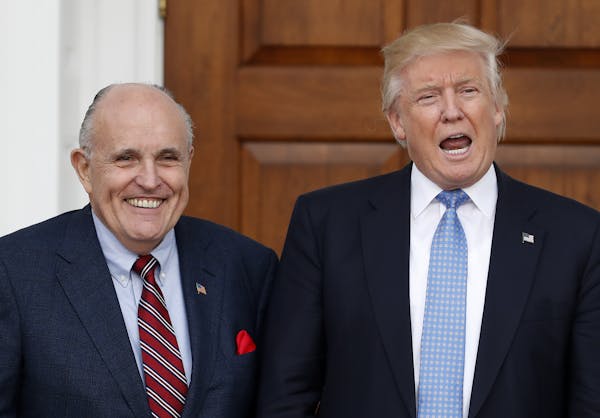LONDON – Even as the FBI and others dig into claims that Russia has a trove of compromising details on President-elect Donald Trump, another hunt was suddenly underway. This one seeks the former British intelligence officer who reportedly had a key role in drafting the classified dossier — and has now gone into hiding.
On Wednesday, Christopher Steele was named as the former MI-6 agent behind the 35-page packet making the explosive — and unsubstantiated — allegations that Russia has embarrassing material on Trump. Steele, however, had apparently caught wind that his identity could be made public, and hit the road. But not before arranging for his neighbor to look after his cats.
The claims in the dossier are still being evaluated by U.S. intelligence experts and others. Russia denied it has a gotcha file on Trump, who had visited Russia in the past to explore business deals and stage the 2013 Miss Universe Pageant in Moscow. But the Kremlin's spymasters have a long history of compiling secrets that can be used later as political leverage.
Trump has called the entire episode a "fake news" smear campaign. On Thursday, Trump tweeted that the report was "false and fictitious" and "illegally circulated." But Trump also put his own interpretation on his conversation with Director of National Intelligence James R. Clapper Jr., who said in a statement that he had spoken with Trump on Wednesday evening and told him the intelligence community "has not made any judgment that the information in this document is reliable."
Trump tweeted: "James Clapper called me yesterday to denounce the false and fictitious report that was illegally circulated. Made up, phony facts. Too bad!"
According to British media reports, Steele, 52, fled his home in Runfold, a village about 40 miles southwest of London. The Wall Street Journal named Steele as the author of the dossier on Wednesday evening.
Before leaving his residence, Steele rang his next door neighbor Mike Hopper and asked whether he could look after his three cats. Steele moved in about 18 months ago with his wife and four kids, his neighbor said.
"He has asked me to do that sort of thing before, so I didn't take it as anything different. I was just about ready to go to work, and he called me and asked me to come in, gave me the key to the house … He said that the family would be away for a while, would I mind looking after the animals?"
Steele didn't say where he was going, or when he would be back, Hopper said.
Steele is the director of Orbis Business Intelligence, a London-based intelligence firm. Chris Burrows, his business partner, told the Wall Street Journal that he wouldn't "confirm or deny" if the company had written the report.
The business' website says that the company was launched in 2009 by former British intelligence professionals.
The firm is located in an upscale area in London, not far from Buckingham Palace, and has a "global network of senior associates." On Thursday afternoon, there were half a dozen journalists milling outside.
"We provide strategic advice, mount intelligence — gathering operations and conduct complex, often cross — border investigations," the firm says on its site.
Neither Steele nor Burrows could be reached for comment.
While Steele's name was first published in the United States, the British press — not usually known for their restraint — held off for several hours.
In Britain, there is a long-standing tacit agreement between the government and media whereby the media receives a notice — known officially as a "Defense and Security Media Advisory Notice," but more commonly called a "D-Notice" — and agrees not to publish certain information relating to national security. The system has been in place for decades and is purely voluntary.
The British press received such a notice last night, just after 6.30 p.m. local time.
"In view of media stories alleging that a former SIS officer was the source of the information which allegedly compromises President-elect Donald Trump would you and your journalists please seek my advice before making public that name," wrote Air Vice-Marshal Andrew Vallance, the secretary of the Defense and Security Media Advisory Committee, the body that issued the media notice.
"Irrespective of whether or not the stories are true, the public disclosure of that name would put the personal security of that individual directly at risk," he wrote.
But after Steele's name started appearing in the U.S. media "it then became increasingly difficult to hold that line," Vallance said in an interview.
He said that his committee sent around another notice advising the British media to hold off until 10 p.m., thus allowing time for the former agent to "make arrangements for personal security."

Minnesota Sports Hall of Fame: A class-by-class list of all members

This retired journalist changed professional wrestling from Mankato

